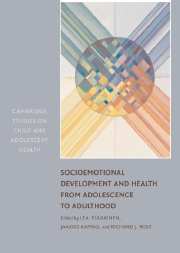Book contents
- Frontmatter
- Contents
- List of Contributors
- Preface
- Introduction
- PART I LONGITUDINAL AND BEHAVIORAL GENETIC APPROACHES
- PART II ADOLESCENT HEALTH-RELATED BEHAVIOR AND ADULT HEALTH
- PART III SOCIOEMOTIONAL BEHAVIOR IN EARLY ADOLESCENCE
- PART IV LIFE COURSE AND HEALTH
- 13 Identity Formation, Personal Control Over Development, and Well-Being
- 14 Sense of Coherence and Optimism: A More Positive Approach to Health
- 15 Unemployment and Psychological Distress, and Education as a Resource Factor for Employment
- 16 Personality, Work Career, and Health
- Summary and Future Directions
- References
- Author Index
- Subject Index
13 - Identity Formation, Personal Control Over Development, and Well-Being
Published online by Cambridge University Press: 07 December 2009
- Frontmatter
- Contents
- List of Contributors
- Preface
- Introduction
- PART I LONGITUDINAL AND BEHAVIORAL GENETIC APPROACHES
- PART II ADOLESCENT HEALTH-RELATED BEHAVIOR AND ADULT HEALTH
- PART III SOCIOEMOTIONAL BEHAVIOR IN EARLY ADOLESCENCE
- PART IV LIFE COURSE AND HEALTH
- 13 Identity Formation, Personal Control Over Development, and Well-Being
- 14 Sense of Coherence and Optimism: A More Positive Approach to Health
- 15 Unemployment and Psychological Distress, and Education as a Resource Factor for Employment
- 16 Personality, Work Career, and Health
- Summary and Future Directions
- References
- Author Index
- Subject Index
Summary
INTRODUCTION
Individuals' conceptions of their personal goals have been studied in the psychology literature from different perspectives. In this chapter, the processes and implications of one's orientations and self-definitions were analyzed along two dimensions: one's sense of identity, and the self-percepts of autonomous control over development. Several researchers (e.g., Archer, 1989; Brandtstädter & Baltes-Götz, 1990; Pulkkinen & Rönkä, 1994) have concluded, on the basis of literature reviews and empirical findings, that adaptive capacities are associated with a clear sense of identity and personal control over development. Although any given cultural and historical context confines the possible alternatives, an individual's developmental pathway is largely a result of intentional choices, based on his or her earlier and current self-definitions and identity (Brandtstädter, 2002).
Careful planning and elaboration of an individual's developmental paths is critical for personal development and the attainment of a high quality of life (Brandtstädter, 2002). We expected one's orientations and self-definitions to play a role in transferring the effects of developmental antecedents to later adjustment in life. The positive implications of favorable family circumstances and good school success have been affirmed in several studies (e.g., Magnusson, 1988; Masten & Coatsworth, 1998; Werner & Smith, 2001). Using the JYLS data, Pulkkinen, Nygren, and Kokko (2002) found that childhood developmental background directly accounted for adult social functioning consisting of external criteria: stability of career line, controlled drinking, and socialization.
- Type
- Chapter
- Information
- Publisher: Cambridge University PressPrint publication year: 2006
- 8
- Cited by

